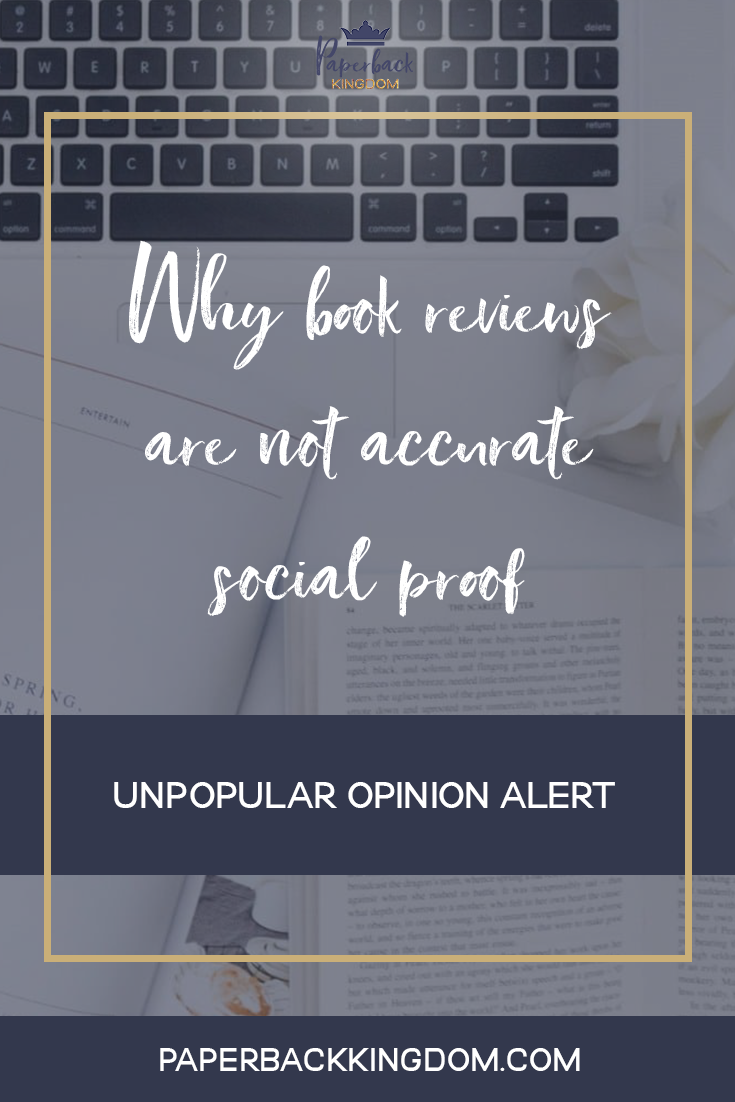Let’s talk about a controversial topic today: book reviews.
In my opinion, there’s a difference between a thoughtful review which takes the time to highlight the positives and negatives in a book, and a review that completely trashes a book.
I’ve avoided writing a post addressing this topic for a long time because having opinions like this puts me on the radar to be criticized. But trust me, I’m well aware that:
- Everyone is entitled to their opinion.
- If you check my books on Goodreads, there are a lot of mixed reviews—so some might assume I’m biased for that reason.
- Reviews are for readers and not authors.
However, I’m a reader too. So I get to have this opinion.
Book reviews are subjective
Book reviews don’t work like product reviews. Products are designed to solve a problem—if they don’t, that’s grounds for a negative review. If they have flaws, that’s grounds for some criticism and feedback.
But books are different. Books are a work of art and are developed from an author’s unique perspective—their own experiences, thoughts, beliefs and opinions influence the makeup of the story (as well as the kinds of stories they are called to write).
Fiction books do not exist to solve a problem, but rather, to entertain and share perspectives in the form of fictional stories. That makes for a very difficult thing to un-subjectively review.
Readers will either like or hate a book. That’s okay—you’re allowed to dislike things and share why a book didn’t connect with you.
But that doesn’t mean a book is bad just because you dislike it.
I personally feel that the way books get reviewed needs to change because so many people will simply call a book bad based on their personal feelings, rather than objectively looking at the work.
Did you know that the Harry Potter Series has 176,183 1 star reviews combined on Goodreads? Harry Potter is arguably one of the best written and most loved book series to exist, and I’m sure those negative reviews get completely overlooked.
However, take that and apply it to a debut author with a small audience. Imagine that the majority of reviews are negative, impacting the author’s potential to find their soulmate readers? And yes, there will be people who love the book. Take Twilight for example-for every person who disliked it, there was someone who loved it.
No one can be the judge of whether a book is truly good or bad-because all opinions are subjective.
But that means that reviews aren’t an accurate form of social proof-because they can’t be measured by whether a book solves a problem. It’s a matter of collective, personal taste.
Should there be guidelines for how ‘art’ gets reviewed?
This is a tricky question because a lot of what makes art unique is the fact that there are so many varying opinions and perspectives. However, I do believe it’s important to protect the credibility and work of artists when reviews are being used to influence sales rather than merely being a topic of conversion.
I believe there should be guidelines for how to review a book. That doesn’t mean you can’t enjoy a book or interpret it the way you want, write a blog post discussing the book in more detail, or share your feelings at a book club, but when giving feedback it should be done following a guideline so that the reviewer doesn’t confuse personal projections with valid criticisms.
When working for a software company, I used to collect reviews for the company’s product using Capterra. I liked how they asked guiding questions in the review submission form so that specific perspectives and opinions could be shared in an honest, truthful way.
I believe this would work far better than allowing reviewers to lean more into their personal feelings and objections. For example, I once read a review where a reader had given 1 star to a book just because the protagonist didn’t hook up with a totally platonic side character.
The book wasn’t even a romance and the reviewer clearly missed the point of the story and got caught up on what they personally wanted to have happen. When it didn’t, they took out their personal disappointment in a way that isn’t fair to the author. The reviewer overlooked the fantastic character development, the engaging storyline and the intricate worldbuilding and lore.
Did that book deserve a 1-star rating for such a personal objection? Absolutely not.
What other forms of social proof are there?
If we can’t rely on book reviews, what else is there? And if reviews are the preferred way for readers to voice their opinions, why do books have to be measured by reviews alone?
Here are some quick tips for authors:
✨ Authors should set expectations by actually TALKING about their book. What themes and issues does it include? What are the characters like? What examples of writing style can you share? I think a big reason readers are let down by books is due to poor placement and advertising. But with clearer messaging about the themes, issues and expectations of a book, a reader is going into it less blind and therefore can’t be upset if things don’t play out the way they anticipate (at least, on a surface level).
✨ Build a stronger reputation. Authors should assess who can vouch and advocate for their writing abilities, and what networks they could tap into to build a more credible presence. Think about awards and credentials.
✨ Set a trend. By increasing a book’s visibility and creating more buzz, the author increases the chances of being discovered by their TRUE fans. Remember Twilight, which everybody disliked? It was so hated on that it drove people to pick it up out of mere curiosity—which proves that all publicity is GOOD publicity.
Do reviewers actually know how to review books?
I’ll be honest, over five years ago (I don’t remember exactly when, but I was still quite young) I left a shockingly terrible review on Rainbow Rowell’s Carry On.
I had so many thoughts and opinions that I didn’t know how to articulate, and looking back I wish I had worded things differently. The truth is that I really didn’t know how to review books back then, or how to process my own thoughts and feelings in a better way. I have never regretted a book review more in my life.
That being said, I have a feeling that’s the case for a lot of readers out there. And I believe it’s another reason we need guidelines to improve the way reviews are produced.
The negative impact of reviews
I think the reason this is such an important issue is because for authors, reviews truly impact our success. I think a carefully crafted negative review is much better than a rant. At least authors can grow from that and do better next time.
The only thing a rant does is repel others from giving us a chance and critically damage our brands. How are we supposed to take your ‘frustration’ and ‘disappointment’ and use it to make our work better? You haven’t given us any guidelines for what to improve or change other than “this was the worst book in the world.”
This is another reason why product reviews are different to book reviews. Manufacturers can usually take criticism and improve features of their products. Authors have an entirely different ‘production’ process to undertake when crafting stories and they could use as much practical guidance as possible.
It’s no use telling me that a character was whiny. What does that even mean? Which scenes could you share as examples? Clearly, I as the author thought otherwise so in order to grow, I need you to give me more than that so that I can do my job better.
The other aspect that comes into this is the fact that many readers will happily criticize a book and complain that it didn’t meet their personal standards… but they have never attempted to write a book themselves. It’s very easy to criticize things like plot and character development when you have never attempted to develop a character for yourself and likely never will.
While I agree that readers are entitled to their opinion, this makes me question if they’re entitled to give criticism and feedback on something they have no personal experience with. What makes them an expert on how a character should be portrayed, the traits they should have, the actions they should take or the personality they should be given?
Of course, you might object here that readers draw experience from all the books they read and can therefore distingish a ‘well written story’ from a ‘poorly written story’, and that’s all the experience they need.
But here’s the thing:
All authors are at different stages of their journey. Some authors are more skilled than others, but expecting everyone to meet the same level of skill is an unrealistic and unfair expectation. Of course you’re going to develop an aquired taste as an avid reader. But that doesn’t mean every author is a bad writer and deserves a bad review-especially when the years of experience they do have put them miles ahead of what most readers can do.
But of course, authors aren’t allowed to have opinions like that… 🙄
Authors don’t get to have opinions on book reviews
One of the big reasons I was hesitant to air my opinion on book reveiws is because I felt like I wasn’t allowed to have one. but to be honest, I’m tired of my voice being squandered when real issues like this aren’t being addressed and likely never will unless someone has the guts to speak up.
I know reviews are for readers. I can understand that as readers are our audience. But keep in mind that authors never write with the intention of writing a bad book, or angering a reader. So to take books so personally and then insist that we don’t get to have opinions about your opinions is frustrating.
Yes, we want you to read our books. Yes, we want to know what you think.
But no, you don’t need to be nasty about it. And no, I would never directly attack a reader for sharing their opinion. But that doesn’t mean it won’t affect me. Sometimes I have days where reviews discourage me from ever getting up and trying again.
And to be honest, that saddens me, because I know a lot of amazing authors are afraid to put themselves and their work out there for this exact same reason.
It’s upsetting because writers need writing like humans need air. We may do it because we care about our readers, but we began writing for ourselves and no one else.
Our books start as a fleeting idea of inspiration. They are passion projects we fervently pursue in the dark corners of our office on a Friday night, while commuting on the subway train, or in the 30-minute lunch break we get at work while our grilled cheese goes cold. We do it because we want to.
We spend hours of our time and mental energy into the craft of our books, and we’re well aware that we won’t see more than a dollar at most for each copy it sells in the end.
But despite all of this, we make the intentional decision to share our stories with you.
It’s an act of great courage and vulnerability to allow others to read the work we have held close to our hearts, worked for years on, and likely agonized over through dozens of drafts. We open ourselves up to criticism and hate in the hopes of touching hearts and bringing joy instead.
If you could just for a moment imagine what that’s like, then imagine how it feels to have your work ripped to shreds tactlessly.
So next time you go to write a review, I urge you to consider this:
Words hurt—take it from someone who writes words for a living.
So let’s reassess how we write reviews and ask ourselves how we can do so moving forward with more tact, respect and thoughtfulness.
(P.S: I wrote this post to start a dialogue and share my perspective. I’d love to hear what you think.)

Written by Pagan Malcolm
Pagan is a copywriter and business coach helping writers understand the business side of publishing so that they can become serious authors.
| Facebook Group | Instagram | Podcast | Website | Blog |

